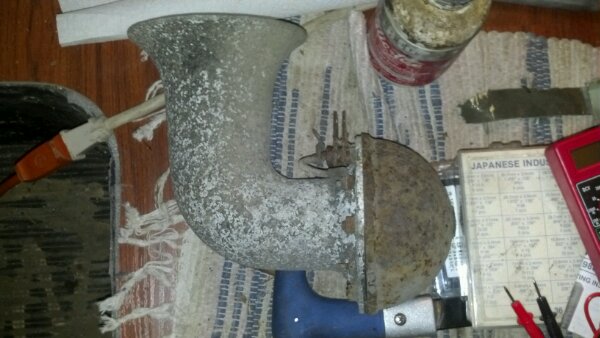Well it has been awhile since we did an update, so here goes.
Currently there is a sizable list of very large projects being worked on for The Ghost. Starting with the most recent, two full power Coleman Mach I Air Conditioner units were mounted to the roof. One mounted just forward of the kitchen area, and one just aft of the bathroom/clothing storage area divider. These units are both mounted offset to the drivers side so that their most extreme points are just inside the outside dimension of the chassis. This works to my favor in the way that I won’t have my head getting knocked on the AC unit ductwork/controls (as with most RV’s) as well as being able to run the ductwork behind the stock wiring/air cavities in the roof of the bus. Units weigh in at about 80lbs a piece and are very low hour usage. Filters for dust and debris will need to be affixed to both the exterior air intakes as well as the interior air intakes to prevent condenser/evaporator contamination. 1500W heating units may eventually be mounted as well inside this AC units.
Another big task on the list is getting the updated (1960’s) 4-valve head inspected, rebuilt, and ready to swap out in place of the original 2-valve. The main factor in wanting to make this upgrade is the increased availability of Jake Brake assembles for 4-valve heads. The 2-valve head Jake Brakes are quickly approaching impossible to locate, so this upgrade should yield acquiring a set of Jake Brakes for ~$400. The potential head for rebuild came from Dan off a motor that dropped a couple valves and locked up. We’ll see if it is rebuildable. A note on this, a pretty serious inspection of the existing engine required determining if it was of the ‘low’ or ‘high’ block design. The low block being much older, uses a different head-gasket (which is almost impossible to find) and some strange ports on the engine where the newer ‘high block’ does not. Fortunately, it appears The Ghost currently houses a 6-71 Detroit High Block (2-valve). Yay!
With the head, the 6 fuel injectors also need rebuilt, so those are currently in the shop getting rebuilt and balanced within 10%. A few had stuck racks, which can indicate water intrusion, but injectors are easy to come by (relatively) so the replacement rebuilt units should be ready soon.
The water tank was recently ordered (expensive!) however at 125 gallons, it was worth buying a quality marine grade tank that will last for a very long time. Material of choice in this case is a drinking water safe poly (3/8″ wall thickness!). This will be located on the starboard side aft of the rear axle under the sleeping area but inside the passenger compartment to help prevent freezing and road damage. That should arrive soon via freight (also expensive for some reason).
Bedroom/bathroom walls are up, and the door is cut and ready to weld together (1″ aluminum box). Need to insulate and sheet the remaining areas and start working on the bathroom floor. The black water (toilet) tank will likely be made out of stainless steal or some other coated metal to optimize the tank size under the coach (odd shaped compartment, but lots of available volume). I will likely have this sheet plasma cut out, and then weld it together and seal the seams to prevent issues with porosity later down the road.
All the wheels/tires have been upgraded to 22.5″ currently BUDD style rims with new lug nuts/bolts where needed. The ride is very nice with radial ply tires versus the old bias ply design.
A fuel sender was also recently affixed to the fuel tank (mounting/hole already existing!) so that fuel level can be determined via gauge instead of dip tube or guess work. Currently this is a universal sender (Stewart Werner type) and the gauge is a positive ground 12V unit I scored off of ebay. Works good. A 14″x14″ hole was cut in the floor directly above the fuel tank to allow access to the sender for future repairs/adjustments. There is also a breather located nearby that may eventually need service and not having to drop the tank would make this access port well worth while.
The new FanTastic RV vents are working wonderfully and without any water leaks to the exterior. These powered 12V auto open/close w/ rain detector vents make camping a breeze. Now just to have them somehow detect dust and close when the dust storms come 🙂
Once the water tank arrives, I will start fabricating the bed/desk/clothing storage areas. Sound and heat insulation will be affixed wherever possible.
Soon to be also upgraded will be the rear brake actuator so that they can operate with an Emergency Brake mode (so I can stop the bus if I am out of air). The foot valve, a D1, was recently rebuilt on my living room table and I posted a how-to since that is a VERY old rare foot valve to still be on the road. Working flawlessly now and air loss from the main tanks now is far less of an issue when the coach is parked. The windscreen wiper controls are the next biggest source of leak.
Well that is all for now. Many other small fixes here and there have been done…feel free to stop by and check it out if you desire.

